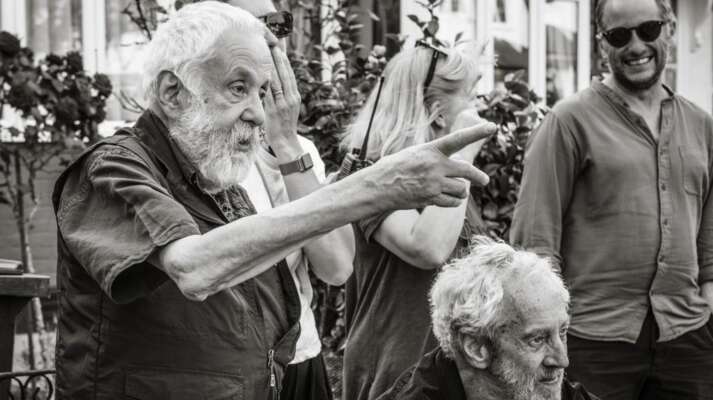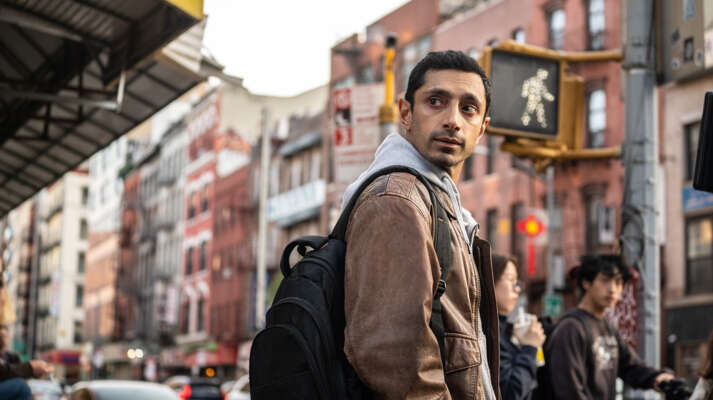Keeping the Faith
A look at Disobedience's Orthodox Jewish communities
Keeping the Faith
Written by Peter Bowen
In Sebastián Lelio's Disobedience, Ronit (Rachel Weisz), a photographer living in New York City, returns home after she learns that her father, an esteemed Rabbi in the Orthodox Jewish community in which she grew up, has died. For Ronit, the trip back to the Northern London neighborhood of Hendon is more personal than geographical, retuning her to a religious culture in which she had grown up, but had abandoned to find her identity. Her childhood friends Dovid (Alessandro Nivola) and Esti (Rachel McAdams) stayed behind, getting married and following the specific roles laid out for them by tradition. Esti, for example, wears a sheitel, a wig worn by married woman.
For Weisz, Ronit was raised Orthodox, but now questions it, asking, "Why should women have to get married and wear five wigs? Why can't she drive on a Saturday?" Many practices that were once second nature now feel foreign. When Ronit reaches out to embrace Dovid as an act of comfort, he gently rebuffs her, upholding the principle of negiah, which restricts physical contact between members of the opposite sex.
Naomi Alderman, who wrote the award-winning novel Disobedience on which film is based, has written passionately about the local Orthodox community. Growing up Jewish in the same neighborhood, Alderman looked on with both awe and pride at this private world. "So much of Jewish Hendon is hidden, intentionally half-submerged so as to be almost invisible to outsiders," Alderman wrote in London's Time Out. "The bakeries and restaurants only identify themselves as kosher by the tiny certificate of rabbinical approval pinned to the wall. The estate agents are brasher, with signs in the window saying ‘We speak Hebrew here.' But the signs themselves are in Hebrew."
To learn more about this world, Nivola dove into research, meeting with a range of Orthodox Jews from the area. "What I discovered was that there are a million shades of grey in terms of how people observe their religion," Nivola explains. "And because of that, I felt a responsibility throughout the making of the film to capture the incredible warmth of the Orthodox community." In London, Orthodox Jews span a wide spectrum of beliefs and practices, from those who are fully integrated with the general public to Ultra-Orthodox or Haredi who maintain separate schools and institutions.

Many accounts chronicle the first Jews in England to the time of William the Conqueror in the 11th century. Since then, the history of Jewry in England has been a bumpy ride filled with quiet acceptance and violent ostracism. By the 19th century, however, Jews had become both an integral and recognizable part of London. In 1847, David Salomons became the first Jewish alderman, and then the first Lord Mayor of London eight years later. Although he converted to Christianity as a boy, Benjamin Disraeli became the first—and only—British Prime Minister of Jewish birth when he was appointed in 1868. George Eliot's 1876 novel Daniel Deronda provided one of the first serious looks at Jewish life, at least among the upper class.

In the late 19th century, emigration from Russia nearly tripled the Jewish population to some 150,000 people in London. Jews fleeing from the Nazi threat found safe haven in the capital, especially in neighborhoods with established synagogues and communities. In 1922, the consecration of a synagogue in Golders Green (just southeast of Hendon) established one of the first Orthodox communities in the neighborhood. In 1928, the Hendon Synagogue was founded. Many of the emigrated Jewish populations favored some form of assimilation with British society. For Geoffrey Alderman, the father of Disobedience's author and a leading scholar on British Jewry, most of these new Jewish communities embraced their new nationality. "My ancestors…came here from Eastern Europe, they wanted to be British, they were extremely proud to be British," he told the BBC. For Alderman, this is in stark contrast to the isolationism of some ultra-Orthodox groups in London.

In 1926, Union of Orthodox Hebrew Congregations was established to organize the Haredim in London. With its stated mission "to protect traditional Judaism," it serves the growing Haredi communities, especially around Stamford Hill, Golders Green, Edgware, and Hendon. In recent years, the Haredim have thrived, even as the general Jewish population has declined. Fundamentalist in belief, the Haredim maintain a strict adherence to Jewish laws governing dress, food, relations with the opposite sex, and education. Joe Lobenstein, who fled Hitler's Germany for London, explains succinctly to The Telegraph the importance of tradition and continuity for his Haredi community: "A person who lives by the Torah is a happy person and a group of happy people are by definition a happy community."


